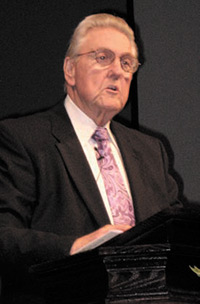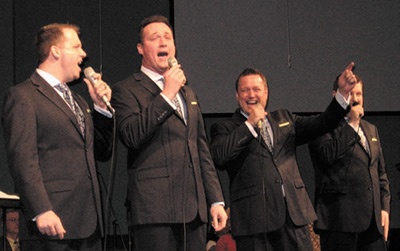The 2012 edition of the South Carolina Baptist Conference on Evangelism opened to an overflow audience last Wednesday evening at Hoffmeyer Road Baptist Church in Florence, which hosted the event for the second straight year.
 From left: David Dinkins, pastor, First Baptist Church, Kingstree; Randall Jones, evangelist from Conway; Frank Shivers, evangelist and author from Columbia; and host pastor Laneir Singleton.
From left: David Dinkins, pastor, First Baptist Church, Kingstree; Randall Jones, evangelist from Conway; Frank Shivers, evangelist and author from Columbia; and host pastor Laneir Singleton.The theme of the conference – for decades an annual staple of denominational life in South Carolina during February – was a question, “Where are the Workers,” drawn from Matthew 5:37-38 in which Jesus says to his disciples, “The harvest is abundant, but the workers are few. Therefore, pray to the Lord of the harvest to send out workers into His harvest.”
In welcoming the conference participants on opening night, Laneir Singleton, senior pastor at the host Hoffmeyer Baptist Church, said, “What I want to see is nothing less than the touch of God on this meeting.” He prayed that God would “revive us again that thy people may rejoice in thee.”
Randall Jones, a retired Conway pastor who now is a full-time evangelist and contract worker for the South Carolina Baptist Convention, presided. He was praised by executive director-treasurer Jim Austin for “being in the forefront” of planning the conference.
The Conway evangelist evoked applause from the large congregation as he reported on the upturn in baptisms last year, and said that when the statistics for the current year come in, “I hope that we’ll stand back in amazement at what God has done.”
Jones even raised the possibility of launching a second evangelism conference if the interest and support are there.
Austin expressed gratitude that “God is doing a wonderful work in our churches,” adding, “God is at work around the world. Christianity is growing at a fast rate.” His prayer, he said, is that “America will experience revival as well.”
Lee Clamp, director of evangelism for the convention, called on the large gathering to “become advocates for the lost.”
He echoed words first written for the SCBC’s Focus magazine that most church people simply are not “actively serving others or telling the greatest story known to mankind.”
Clamp pointed out that perhaps as many as 90 percent of the people in the gathered church have “never had a conversation about the gospel with anyone else.”
“The church must,” he said, “build relationships with those who do not know Jesus and will be held accountable for telling the story.”
For the evangelism leader, a movement in that direction starts with a conversation about Jesus and the salvation he freely offers. “Conversions will increase in this state,” he declared, “when conversations increase.”
Asking “who is one person you need to tell about Jesus,” Clamp said, “Stop waiting. Start the conversation.”
 Junior Hill
Junior HillThe conference sessions that ran from Wednesday through Friday evening were filled with music and preaching. It was a beloved evangelist from Alabama, Junior Hill, who delivered the opening message followed by a second one on Thursday morning.
Hill, always popular with South Carolina Baptists, centered his sermon on Luke 5, which finds Peter frustrated over a nighttime of fishing without catching anything. When Jesus tells Peter to “put out into deep water and lower your nets for a catch,” Simon complains, “Master, we have worked hard all night and have caught nothing.”
The Alabama evangelist at that point paraphrased the future disciple. “What Peter really was saying was, ‘Jesus, with all due respect, we’re professional fishermen and you’re a carpenter. Don’t you think we know more about fishing than you do?’?”
Hill said the passage is all about evangelism, with the net representing the “word of God, the Bible” and the fish representing the souls of people.
“The fallacy in our thinking,” Hill noted, “is that believing in the Bible, being doctrinally and theologically correct means you’ll catch fish.”
Most of the “men of God,” Hill said, singling out pastors faithful in their preaching, “are being persistent, they have their hands to the plow, they’re throwing out the net and sowing the seeds, but many aren’t catching any fish – any souls.”
“The catch,” he declared, “must never determine the commitment. We must do what Jesus says to do, whether we catch any fish at all. We’re not responsible for the catch; we’re just responsible to fish.
“God will take care of the catch,” he said, “and we must take care of the command. So throw the net, throw the net, throw the net, and maybe in God’s sovereignty somebody will get in it.”
Turning to Peter’s initial reluctance to do what Jesus said, Hill said simply, “We need to learn to obey God. Peter’s reply to Jesus indicated that Jesus didn’t know as much about fishing as they – professional fishermen – did. They were sure that after a night of catching nothing, there must be no fish in that lake. But it’s not our job to evaluate the situation. It’s our job to proclaim.”
“Just scatter the seed,” he concluded, “and leave it to God to provide the harvest.”
 The Old Paths quartet from Atlanta entertained and inspired conference participants with Southern Gospel tunes.
The Old Paths quartet from Atlanta entertained and inspired conference participants with Southern Gospel tunes.